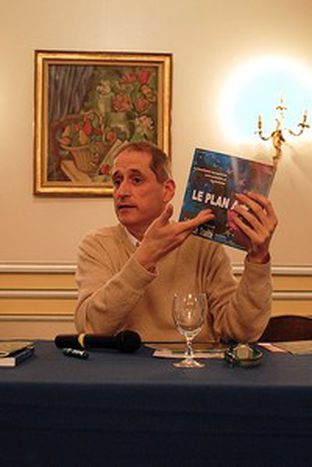
'The most interesting part of my Plan A+ is the +'
Published on
Translation by:
 kate stansfield
kate stansfield
The vice-president of the European Parliament, 46, suggests reducing the four parts of the constitutional treaty and putting it to a transnational referendum
During the European Council of Brussels on 21 June, Europe begins a new 'relaunch' phase for a constitutional text, marked by the election of the new French president Nicolas Sarkozy on 6 May. Another French politician, the vice-president of the European Parliament and member of the Greens/ European Free Alliance, Gérard Onesta, is offering an alternative way out of the crisis - the 'Plan A+'.
Currently, the constitutional treaty is a book divided into four parts, containing everything from European Union policies to the Charter of Fundamental Rights. Onesta suggests making it lighter. Citizens would only vote by transnational referendum and on the most constitutional part. National parliaments would be responsible for adopting the policies and various annexes.
His Plan A+ is an exhaustive analysis of the European constitutional treaty. It reveals its most positive points along with those that, in principle, could be seen as negative by citizens, attempting to improve on them with a new more accessible proposal. For Onesta, that involves conserving the essence of the constitutional treaty.
'It is clear that we have achieved much more with this constitutional treaty than with previous versions. That's why I call it Plan A.' He added a plus sign because it conserves the constitutional part - such as the Charter of Fundamental Rights and operational procedures of the European Union. The constitutional part is separated from the Treaty, with the latter containing the policies and protocols. 'Basically, it's about deconstitutionalising the treaty,' he concludes.
A text adopted or rejected by European citizens
According to Onesta, the fact that he has conserved the treaty as it is, only separating one part so that the 'constitutional booklet' is voted on, is a question of 'extending the power to the citizens.'
This way, Europeans won't have to vote on such an exhaustive text. It makes it much simpler to hold a referendum on the same day in all the member states. 'This will allow a balance between the large states and the smaller ones, since the constitution would be decided among the whole set of Europeans; the citizens of a particular country could not block the constitutional process in the way Holland and France did in 2005.'
Many question the need to vote again on something that has already been adopted. For example, in Germany, who currently hold the six-month European presidency (January – July 2007). According to Onesta, if German citizens had been able to vote by referendum, they would have said no to the treaty. However, by using his method of the transnational referendum, it would be adopted by a broad majority.
'That is what Germans really want. This is an example of citizenship wanting to vote on the constitution by referendum. Bear in mind that at the moment, it is a 'consultive referendum'. This means that after consulting their citizens, national parliaments must still adopt the constitution. A majority of European citizens is needed to adopt the constitution, and for that reason it needs to be carried out on the same day on a transnational level. A definitive referendum with just one constituency: the European continent.'
Confusion has been created among citizens by the word 'referendum'. For example, the French voted in a decision-making referendum, whilst citizens in Spain and Luxembourg only voted in a consultative referendum, and in other countries like Germany, referendum is not provided for in the constitution. To this end, Onesta also suggests changing the word itself to 'popular consultation. A transnational consultation would be confirmation on a continental scale for those countries that have already voted yes.'
Against the right to veto: the 'double and superqualified majority'
In addition to the problem of a 'heavy' constitution, the issue of its validity over time has been raised on many occasions. Many wonder why a constitution should be adopted only to be reformed within a few years and on a continuous basis, so that it evolves at the same rate as the European community.
For Onesta, amendments lie within the competence of those who represent the people. 'The European parliament has the right to update the constitution so that it adapts to new times. The parliament hopes that this will allow it to improve things in the future.' Onesta says it is clear that member states must make way for the double 'super-qualified' majority in order to remove the right to veto in the European council, and to avoid Europe's further paralysis. Decisions would then be taken by '80% of heads of state and government, and 80% of national parliaments; only then will we have renewed advances in the construction of Europe.'
Follow cafebabel.com Brussels, who are blogging the event live
Translated from Gérard Onesta: Lo más interesante de mi plan A+ es el +


